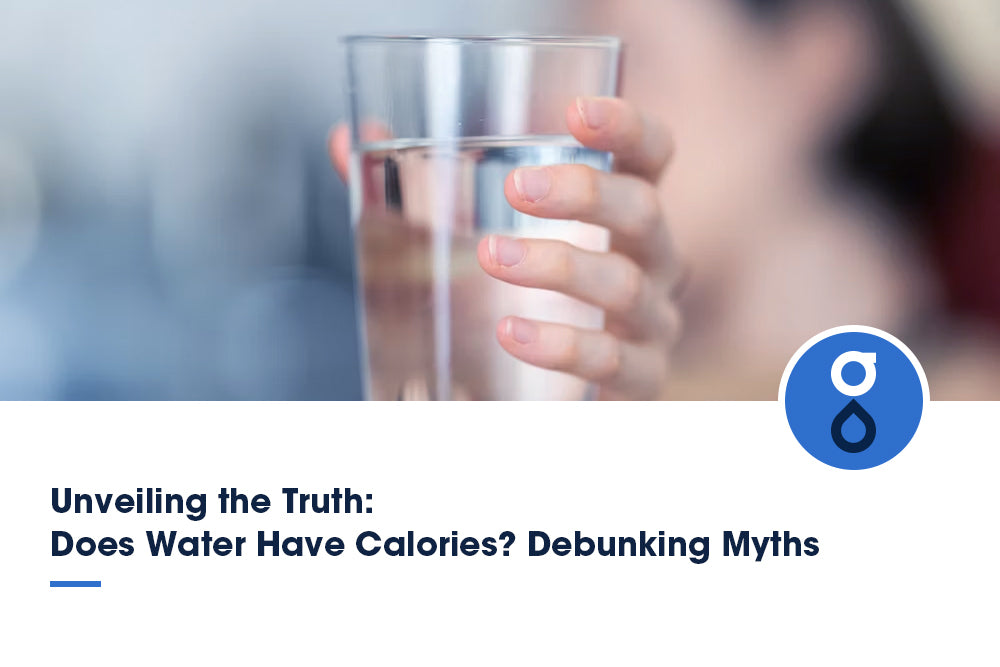Table of Contents:
What are calories, and how much do you know about them?
Debunk the myth: water does not contain calories
How do you calculate your daily caloric needs?
Surprising findings on hidden calories in certain drinks
Tips for staying hydrated without consuming empty calories
FAQs
Conclusion
Do you ever feel like you're carrying around extra baggage? Well, let me tell you something: water is not the culprit. Contrary to popular belief, water does not have calories. Yes, you heard that right! In this article, we will bust some common misconceptions surrounding the calorie content of water.
Get ready to dive into the facts and uncover the truth about hydration. From understanding what calories are to discovering hidden calories in certain drinks, we've got you covered. So, grab a glass of water (calorie-free, of course), and let's embark on this myth-busting journey together.
What are calories, and how much do you know about them?

Do you know how many calories you consume in the foods and drinks? Understanding the concept of calories is essential for managing your weight and overall health. Calories are units of energy that our bodies need to function. They come from the food and beverages we consume.
Different types of beverages have varying caloric content. For example, sugary drinks like soda and fruit juices are high in calories, while unsweetened tea has zero calories. This understanding is crucial in making healthier choices regarding what you drink.
Additionally, it's essential to grasp the concept of 'empty calories'. These are calories that provide little to no nutritional value. Foods and drinks with added sugars and fats often fall into this category. Consuming too many empty calories can contribute to weight gain and other health issues. Therefore, you must be mindful of your intake and opt for nutrient-dense options whenever possible.
Debunk the myth: water does not contain calories.

Water is a beverage that most people consume daily, and it's often touted for its numerous health benefits and hydrating properties. One common myth surrounding water is that it contains calories. However, this is not true. Water is a calorie-free drink that doesn't contribute to your daily caloric intake. Here are a few reasons why water is a calorie-free beverage:
1. Health benefits of drinking water: Staying hydrated is essential for overall health. Water helps to regulate body temperature, lubricate joints, and transport nutrients throughout the body.
2. The importance of staying hydrated: Dehydration can lead to various health problems, including fatigue, headaches, and kidney stones. Drinking enough water ensures that your body functions properly and optimally.
3. Different types of calorie-free beverages: Several choices are available if you're looking for other calorie-free options besides water. These include herbal teas, black coffee, and unsweetened sparkling water.
Debunking the myth that water contains calories is just one of many misconceptions surrounding this essential drink. Other common water myths include the belief that drinking water can cure all ailments or that you must drink eight glasses daily. It's important to separate fact from fiction regarding water and its benefits. Water aids digestion and weight loss by promoting a feeling of fullness and helping flush out toxins from the body. So, drink up and enjoy the calorie-free benefits of water!
How do you calculate your daily caloric needs?

To calculate your daily caloric needs, you can start by determining your basal metabolic rate (BMR). Your BMR is the calories your body needs to maintain essential bodily functions at rest. You can use several formulas to calculate your BMR, such as the Harris-Benedict equation or the Mifflin-St. Jeor equation. These formulas take into account your age, gender, weight, and height to give you an estimate of your BMR.
Harris-Benedict equation:
BMR = 88.362 + (13.397 x weight in kg) + (4.799 x height in cm) - (5.677 x age in years)
Mifflin-St. Jeor equation:
BMR = (10 x weight in kg) + (6.25 x height in cm) - (5 x age in years) + 5 (for men) or -161 (for women)
Once you have calculated your BMR, you can adjust your calorie intake based on your activity level and goals. To lose weight, you must consume fewer calories than your BMR. On the other hand, if you are trying to gain weight or build muscle, you will need to consume more calories. Tracking your progress and adjusting your calorie intake is essential to meet your goals.
Understanding your BMR and tracking your calorie intake can help you create personalized meal plans that meet your needs. Calculating your daily caloric needs and adjusting your intake accordingly ensures that you are fueling your body correctly and working towards your health and fitness goals.
Surprising findings on hidden calories in certain drinks

Discover the unexpected truth about the hidden calories lurking in certain drinks. You might be surprised to learn that not all beverages are as innocent as they seem. Here are some surprising findings on the calorie content of certain drinks:
1. Fruit Juice: While it may seem healthy, it can be packed with hidden calories. Some brands even add sugar to enhance the flavor, increasing the calorie count. So, next time you reach for a glass of juice, check the label for added sugars and opt for freshly squeezed or low-sugar options.
2. Flavored Coffee: That delicious caramel macchiato or pumpkin spice latte might secretly sabotage your calorie intake. Flavored coffees often contain syrups or sauces that can add many calories. Choose plain coffee or sugar-free syrups to enjoy your favorite flavors without the extra calories.
3. Alcoholic Beverages: It's no secret that alcohol can be high in calories, but some drinks are surprisingly more caloric than others. Cocktails like margaritas and piña coladas can contain sugary mixers, increasing their calorie content. Opt for lighter options like vodka soda or a glass of wine to keep your calorie intake in check.
These unexpected findings challenge common calorie myths and highlight the importance of highlighting the hidden calories in certain drinks. Stay informed and make mindful choices to maintain a balanced and healthy lifestyle.
Tips for staying hydrated without consuming empty calories

Stay hydrated and avoid consuming empty calories by choosing beverages low in sugar and free of artificial sweeteners. There are various ways to stay hydrated without relying solely on plain water. Here are some tips to help you quench your thirst while avoiding unnecessary calories:
Hydrating foods: alternatives to drinking water. Incorporate fruits and vegetables with high water content, such as watermelon, cucumber, and strawberries, into your diet. These not only provide hydration but also essential nutrients.
Importance of electrolytes in hydration. Electrolytes, like sodium and potassium, help regulate the balance of fluids in your body. Consider sports drinks or coconut water, which contain electrolytes, to replenish them after intense physical activity.
Hydration for athletes: tips and tricks. Athletes can benefit from hydrating before, during, and after exercise. Drinking small sips of water throughout your workout and choosing sports drinks can help maintain electrolyte balance and prevent dehydration.
Herbal teas: a flavorful way to stay hydrated. Herbal teas, such as chamomile or peppermint, provide hydration and offer a variety of flavors without added sugars or artificial sweeteners.
Hydration and skincare: the connection between water and healthy skin. Adequate hydration plays a crucial role in maintaining healthy skin. Drinking enough water can help keep your skin hydrated and improve its appearance.
FAQs
Does drinking cold water burn more calories?
When you drink cold water, your body needs to work harder to warm it up to your body's core temperature. This process increases your metabolism and can help you burn more calories.
Can drinking water before meals help with weight loss?
Drinking water before meals can aid in weight loss by promoting a feeling of fullness. The hydration benefits of water are well-known, but its role in digestion and weight management is often overlooked. Drinking water before a meal fills up your stomach, making you feel less hungry and reducing the chances of overeating. Water also acts as an appetite suppressant, helping you consume fewer calories throughout the day.
Are all types of water calorie-free?
All types of water, including tap, bottled, and filtered water, are calorie-free. Drinking water helps with hydration and supports various health benefits, and there are daily water intake recommendations to ensure proper hydration.
Conclusion
So, the truth is finally unveiled: water doesn't contain any calories. It's a myth that has been debunked. Understanding the concept of calories and knowing how to calculate your daily caloric needs is important for maintaining a healthy lifestyle. Be aware of hidden calories in certain drinks and opt for hydrating options without empty calories. Stay informed and make smart choices with Glacier Fresh for your overall well-being.
Related reading:
Is Reverse Osmosis (RO) Water Safe and Healthy to Drink?
Is It Safe to Use a Reverse Osmosis System for Drinking Well Water?
















